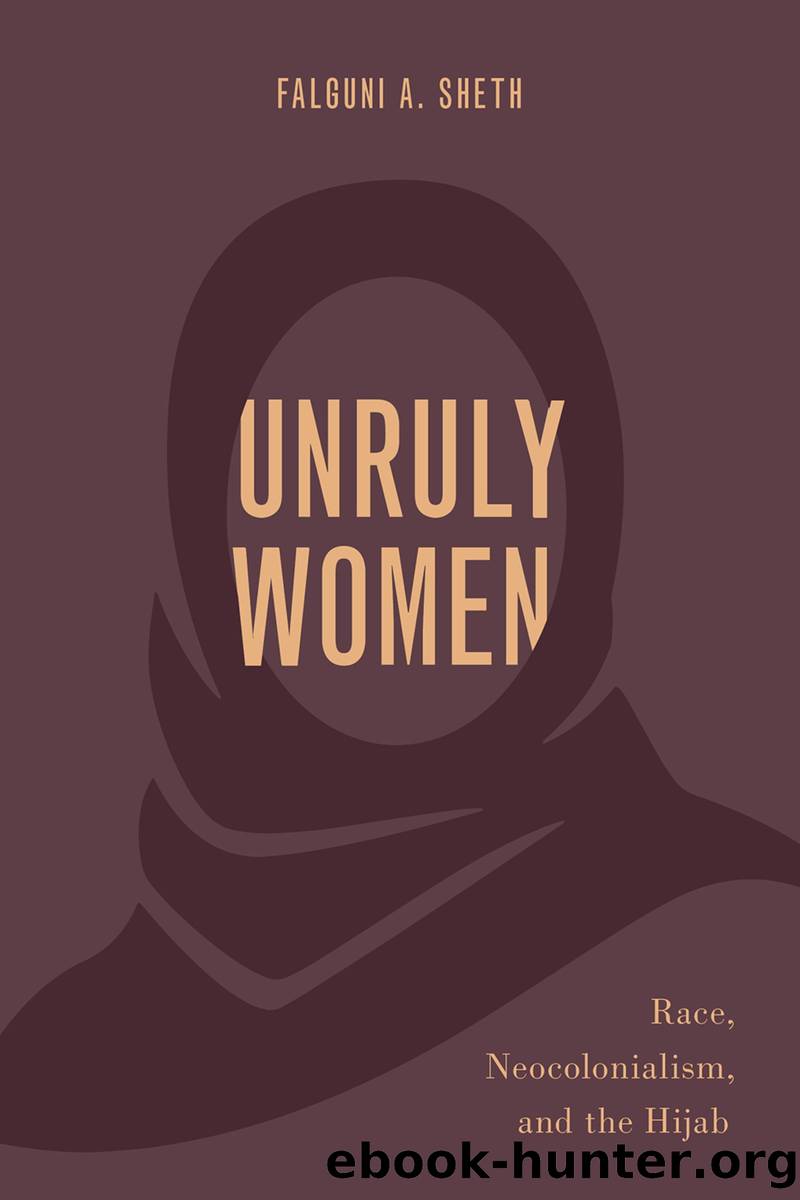Unruly Women by Falguni A. Sheth;

Author:Falguni A. Sheth;
Language: eng
Format: epub
Publisher: OUP Premium
Published: 2021-06-15T00:00:00+00:00
Paul unwittingly offers a genealogy of the secular-liberal doxa of the courtroom as a mirror of the larger society in which it is located. The transition from church to a secular âbusiness meetingâ signals markets as the neutral priority of secular-liberal societies. Therefore, those who dress for business meetings are more likely to show a neutral visage. As Paul points out â[t]he corporate uniform is a token of belonging, to a company or a middle-class community,â but it âalso acts as a disguise, a cover for complicated individuality.â Traits or outfits that signify âpowerful and particular wantsâ are liabilities for any individual who will be subject to scrutiny in a courtroom, since those wants raise doubts and questions about the individual. They will fare better if they appear like any of usâpresumably, we who are a hegemonic, homogeneous population. Indeed, Paul asserts that corporate wear signifies both homogeneity and a âblank screenâ onto âwhich jurors can project their own feelings or fearsâ (Paul 1997, 20).
This projection is true for judges as well, I would suggest. The niqab betrays the inconsistency of liberalismâs claim that individuality is accepted and welcomedâor at least illustrates that it is a limited one. In this case, the judgeâs position betrays a preference for a certain cultural-political comportment that somehow reflects certain shared or transparent understandings, views, attitudes. We have seen in prior chapters that âproperâ cultural-political comportment entails a certain etiquette, a stylized behavior that is often expected of good citizens in liberal publicsâwhich follows from the secular-liberal doxa that serves as the colonial backdrop of those liberal publics. That behavior should express certain key characteristics that are thought to be features of liberalism. Included in those presumed features is a certain familiar sociabilityâor the ability to engage and interact with other liberal subjects. The features of this liberal subject include an exhibition of collegiality (a smile or a placid public facial expression), a mild temper or a certain reserve that is sustained despite disagreements or tensions, an ability to follow and mimic the logics of other liberal subjects (what we might call ârationality,â following Enlightenment philosophers), a certain autonomous public visage (the lone individual who does not have a family in tow, but is likely embedded in a nexus of family and social networks), an average build (âheight/weight proportionateâ).7 These traits culminate in a familiarity, a certain recognizability of what the liberal public subject should look like.
That recognizability is expressed through an etiquette of easy and clear communication (mild accent, minimal speech impediments, recognizable facial gestures). All of these, in turn, point to (an)other who is very similar to oneselfâsomeone who is easily readable, you might say. That readability, in many ways, betrays the express commitments of liberalism, which are constituted by a set of rules, codes, and vehicles of transactions that enable its practitioners to interact without having to prove oneâs âreadabilityâ qua trustworthiness. Another way to understand readability is that the presumption of familiarity is the bedrock of the rules of liberalism.
Download
This site does not store any files on its server. We only index and link to content provided by other sites. Please contact the content providers to delete copyright contents if any and email us, we'll remove relevant links or contents immediately.
The European Opportunity by Felipe Fernández-Armesto(571)
The European History Highway: A Guide to Internet Resources by Dennis A. Trinkle Scott A. Merriman(535)
Morgan Kaufmann Digital Watermarking and Steganography by Ingemar Cox Matthew Miller Jeffrey Bloom Jessica Fridrich Ton(529)
The Seven Wonders of the Ancient World by Michael Denis Higgins(521)
Hyperculture by Byung-Chul Han(511)
European Security without the Soviet Union by Stuart Croft Phil Williams(511)
European Security in a Global Context by Thierry Tardy(507)
The Routledge companion to Christian ethics by D. Stephen Long Rebekah L. Miles(499)
Get Real with Storytime by Julie Dietzel-Glair & Marianne Crandall Follis(445)
Hudud Al-'Alam 'The Regions of the World' - a Persian Geography 372 A.H. (982 AD) by V. V. Minorsky & C. E. Bosworth(439)
Tibetan Studies in Comparative Perspective by Chih-yu Shih Yu-Wen Chen(437)
Gorbachev And His Generals by William C. Green(430)
Governance, Growth and Global Leadership by Espen Moe(428)
CliffsNotes on Fitzgerald's The Great Gatsby by Kate Maurer(413)
How Languages Are Learned 5th Edition by Patsy M Lightbown;Nina Spada; & Nina Spada(409)
The Egyptian Economy, 1952-2000 by Khalid Ikram(389)
The Oxford History of the World by Fernández-Armesto Felipe;(388)
Oral Poetry and Narratives from Central Arabia: The Poetry of Ad-Dindan : A Bedouin Bard in Southern Najd (Studies in Arabic Literature, Vol 17) (English and Arabic Edition) by P. M. Kupershoek P. Marcel Kurpershoek(368)
The Oxford Handbook of the Incas by Sonia Alconini(366)
